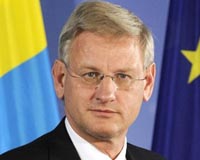| . |  |
. |
Tehran (AFP) July 16, 2009 Gholam Reza Aghazadeh has resigned as Iran's atomic chief after spearheading the Islamic republic's controversial nuclear programme for more than a decade, the Atomic Energy Organisation said on Thursday. No reason was given for the resignation but Aghazadeh has long been close to opposition leader Mir Hossein Mousavi, who claims he won the June 12 presidential election and refuses to recognise the new government of President Mahmoud Ahmadinejad. Mousavi's allegations that the result was rigged triggered massive anti-Ahmadinejad protests which sparked a violent crackdown by the authorities. Aghazadeh's resignation was reported Thursday by the ISNA news agency and later confirmed by organisation spokesman Mohsen Delaviz. "Mr. Aghazadeh made enormous effort during years and years in the nuclear field and thanks to him we are today witnessing extensive progress in this area," Delaviz said. "The name Gholam Reza Aghazadeh will forever be written in the nuclear history of the country," he said, adding that the atomic chief would in due course himself explain his decision to quit. Aghazadeh told ISNA that he had submitted his resignation letter to Ahmadinejad almost three weeks ago and it was accepted. He had also quit as the country's vice president, he added. The atomic chief's resignation comes ahead of sweeping changes expected in Ahmadinejad's next government which will be unveiled next month. The hardline president vowed last month to change the structure of the new government by making "considerable changes" to his cabinet. Aghazadeh is a veteran official of the Islamic republic and was executive deputy to Mousavi during his premiership in the 1980s. He was also oil minister from 1985 to 1997 after which he was appointed chief of the atomic organisation under reformist president Mohammad Khatami. He continued to serve in the same capacity under Ahmadinejad and has been deeply involved in Iran's nuclear programme. Global powers led by Washington suspect Tehran's nuclear drive is aimed at making atomic weapons, a charge strongly denied by the Islamic republic and on several occasions by Aghazadeh himself. Aghazadeh has supervised the nuclear programme which Iran says has developed the technology able to master the complete nuclear fuel cycle. At the heart of Iran's nuclear controversy lies its defiant continuation of enriching uranium. Highly enriched uranium can be used to make atomic weapons while low enriched uranium is used in nuclear power plants. Russian contractor Atomstroiexport is building Iran's first nuclear power plant in the southern port city of Bushehr. It said last month it is too early to set a start-up date though ministers had predicted operations would begin in August or September this year. US Secretary of State Hillary Clinton on Wednesday renewed a US offer to engage Iran in talks aimed at resolving the nuclear crisis. She repeated previous calls to "lead with diplomacy, even in the cases of adversaries or nations with whom we disagree." Ahmadinejad on Thursday insisted his government will remain open to "logic and dialogue" to end the international deadlock, according to a report on state-controlled PressTV. He warned, however: "If each and every one of the Western countries that oppose Iran's nuclear programme joins forces, they would still fail to deprive the Iranian nation of its inalienable nuclear rights," the English-language channel added. Since assuming office in January, US President Barack Obama has taken steps towards engaging Iran diplomatically, departing from the policies of former president George W. Bush who refused direct negotiations with Iran and spearheaded pressure for economic sanctions against the Islamic republic. Share This Article With Planet Earth
Related Links Learn about nuclear weapons doctrine and defense at SpaceWar.com Learn about missile defense at SpaceWar.com All about missiles at SpaceWar.com Learn about the Superpowers of the 21st Century at SpaceWar.com
 'Difficult choices' ahead on Iran: Swedish FM
'Difficult choices' ahead on Iran: Swedish FMStrasbourg (AFP) July 15, 2009 The European Union faces difficult choices in the months ahead in dealing with Iran's nuclear ambitions, Swedish Foreign Minister Carl Bildt, whose country holds the EU presidency, said Wednesday. In remarks to members of the European parliament, Bildt spoke of "difficult choices and judgements that we have to do in the next, not only weeks, but months, but not very much longer than that." ... read more |
|
| The content herein, unless otherwise known to be public domain, are Copyright 1995-2009 - SpaceDaily. AFP and UPI Wire Stories are copyright Agence France-Presse and United Press International. ESA Portal Reports are copyright European Space Agency. All NASA sourced material is public domain. Additional copyrights may apply in whole or part to other bona fide parties. Advertising does not imply endorsement,agreement or approval of any opinions, statements or information provided by SpaceDaily on any Web page published or hosted by SpaceDaily. Privacy Statement |